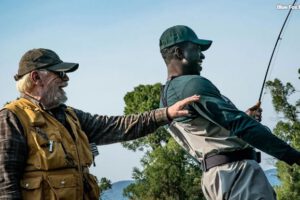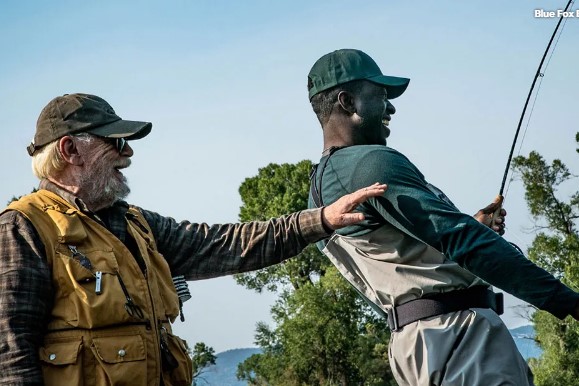Movie Info
Movie Info
- Director
- Joshua Caldwell
- Run Time
- 2 hours and 2 minutes
- Rating
- R
VP Content Ratings
- Violence
- 3/10
- Language
- 3/10
- Sex & Nudity
- 2/10
- Star Rating
Relevant Quotes
The human spirit will endure sickness,
but a broken spirit—who can bear?
“I’ve learned a lot in this year. I’ve learned that the way to get your soul back isn’t to chase it but rather to quietly wait for it. When you’re ready, it finds you.”

Director Joshua Caldwell and scriptwriter Stephen Camelio tell a familiar story—that of a wounded veteran needing more than just physical healing—but with a different twist. The healing comes through fly fishing. And what for a while looks like will become a romance turns out to be something else. And amend that “a wounded veteran needing…healing”–there are three wounded persons in this compassionate film, two veterans and a local librarian.
In what amounts to a prologue we see John Colter (Sinqua Walls) in Afghanistan leading his squad on a dangerous recon patrol in terror-infested country. It is the last day of their deployment, so the soldiers complain about their assignment. Colter over-rules them, and so when he is wounded during an ambush and a couple of his men killed as he lies helpless, he is filled with tremendous guilt.
John survives and is sent back to the Sates where he is treated in several rehab centers. Now, at the V.A. Medical Center in Livingston, Montana, his horrible leg wounds, suffered from the I.E.D. are healing, so he is eager to be sent back to his unit. As he will say several times, his comrades are the only “family” he has ever known. V.A. Doctor Burke (Patricia Heaton) is as concerned for his mental healing as much as for his physical. His PTSD is harder to treat than his leg wounds. She informs him that the final decision resides in a panel who will determine if he is fit to return to active duty. She sends him to group therapy, but he angrily walks out when he learns that the leader has never been in combat. He drinks heavily and awakens to nightmares of that day when he lay helpless on the ground while the terrorists executed two of his “brothers.”
Concerned about his negative attitude, Dr. Burke suggests that he contact Vietnam veteran Ike Fletcher (Brian Cox) to learn fly fishing, that this sport has healing possibilities. She has treated Ike and is concerned that the avid fisherman is now too old to fish alone. Ike and his partner and mentor Harrison (Wes Studi—always good to see this Native American actor!) run a fishing goods store, with Ike a loner forsaking all activities except fly fishing. (He neither watches TV nor movies and refuses to join any veteran group.)
The old man, smelling whiskey on Colter’s breath, at first refuses his request for lessons because he himself is a recovering alcoholic. Later, prodded by Harrison, he agrees, and the younger Marine comes daily to the shop. But, like in the Karate Kid, he is given only scut work—cleaning up and unpacking boxes of merchandise. He also is required to learn about the many kinds of fishing ties that his teacher creates and to start reading the literature of fly fishing. Finally, the actual lessons begin as Ike explains the Zen of casting and standing in the water looking for signs of where a fish is. When he catches and then releases a large fish, Colter is surprised. “I am done with killing,” the ex-Marine replies.
There is a fourth major character in the story, Lucy (Perry Mattfeld), a librarian and volunteer at the rehab-facility. She had seen Colter at the latter, but their first face-to-face meeting is when he comes to the library seeking fly fishing literature. She recommends The Sun Also Rises because of its fishing episode, but soon gathers a small stack of works on the subject. As they begin to keep company it is the book by Texan Steve Ramirez Casting Forward that the two read together—not the Hemingway novel, nor even the well-known book made into a movie, A River Runs Through It.
We learn that Lucy also is still grieving over the loss of her fiancé, who was a combat soldier. Soon the two of them are seeing each other almost daily. One of the film’s lighter moments is when Colter invites her to go fishing with him and Ike and Harrison, and, as he supposedly thinks he is teaching her how to cast, discovers that she has ben a long-time student of the two expert fishermen.
The romantic arc does not develop as expected, and Ike pays a price for his trying to fish at times alone. When Colter visits Ike in the hospital, the mentor says to him, “In the book of every soldier’s life, the military is a chapter. It never leaves you. But (lowering his voice) it’s not, not the whole story.”
Indeed, it is not. Neither for Colter nor, for that matter, for Ike. The younger man has learned that his mentor has a son and grandchild from whom he has been estranged for many years. Colter helps complete Ike’s story, his act of grace contributing to his own healing. At he end of the film we are shown real life veterans casting their rods, members of a group known as Warriors & Quiet Waters. The film’s story might be fictional, but Colter’s situation and the use of fly fishing to bring healing are not.
This review will be in the July issue of VP along with a set of questions for reflection and/or discussion. If you have found reviews on this site helpful, please consider purchasing a subscription or individual issue in The Store.

